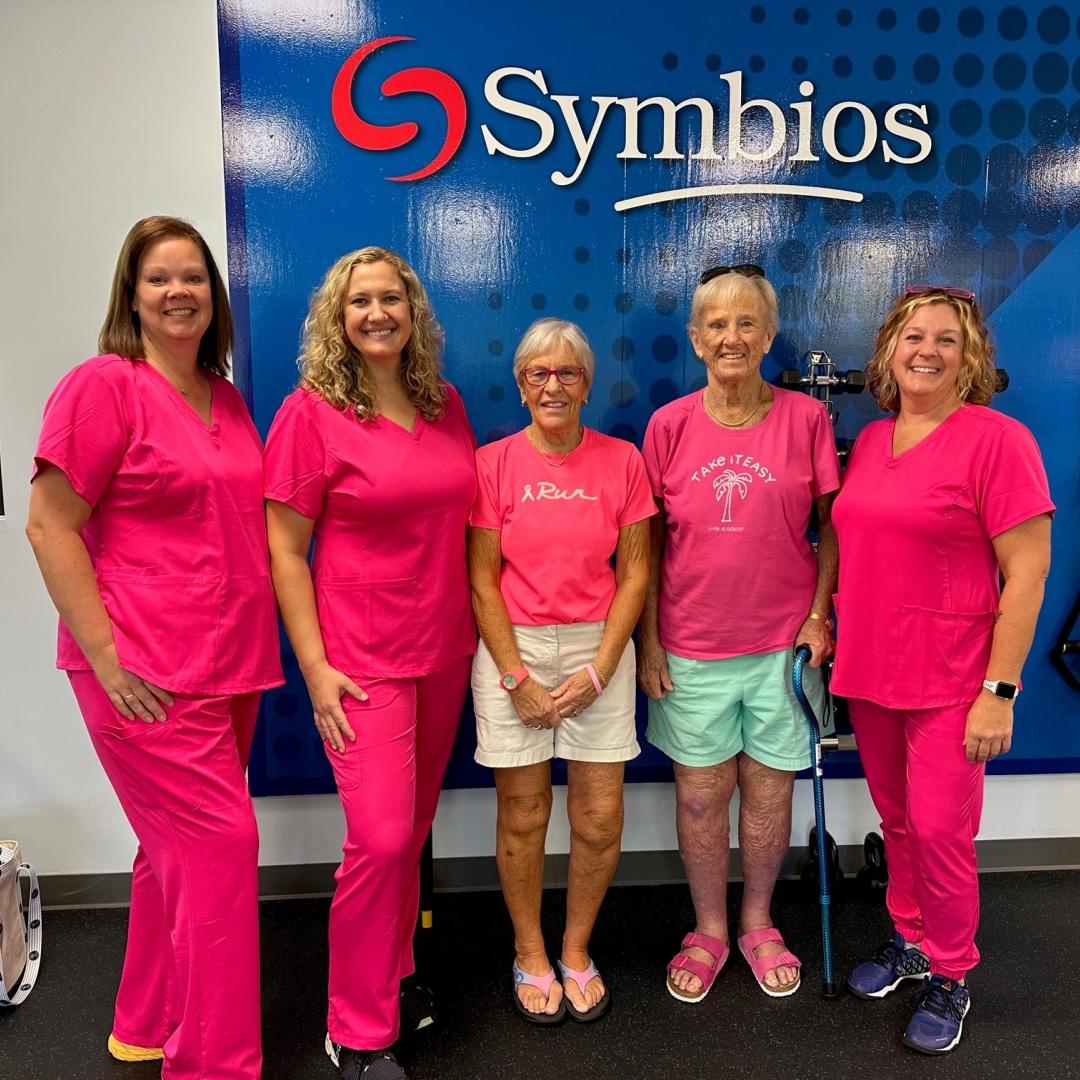by Stephen Luther, M.D.
Share

Symbios’ Year-Round Commitment to Women’s Health and Physical Rehabilitation
October unites the world with awareness against a single enemy, breast cancer, which affects one out of every eight women. That’s why Symbios urges awareness of potential signs and symptoms, especially because early detection can boost survival rates.
Symbios also understands the journey does not end with a diagnosis, thus also drawing attention to physical rehabilitation to manage cancer treatments for a severe complication that may occur alongside breast cancer: lymphedema.
Symbios is committed to empowering you with personal healthcare knowledge derived from comprehensive year-round care. Take control of your health with regular well-checks and learn more from our relevant information emailed weekly, as Symbios stands with you in cancer prevention, detection, diagnosis, treatment, and recovery.
Defining and Detecting Breast Cancer
Breast cancer begins when breast cells begin to grow abnormally. These problematic cells can accumulate into a mass or lump as they divide more rapidly than healthy cells. Early detection may limit breast cancer cells from metastasizing or spreading to other parts of your body or lymph nodes. While each breast cancer case may present differently, be aware of these five common signs and symptoms and promptly consult a medical professional if you:
- Notice changes in breast color, feel, or texture, such as redness and dimpling, which may resemble the texture of an orange peel.
- Observe differences in nipple placement, an inverted nipple, or any discharge unrelated to breastfeeding or pregnancy.
- Experience faster than normal breast shape, location, or size alterations, not from weight change.
- Feel any unusual sensations, such as itchiness or irritation in the breast.
- Detect a mass or thickening in the armpit or breast, which may present with or without pain.
Screening and Diagnostic Steps at Women’s Health
Recognizing, understanding, and diagnosing breast cancer goes hand in hand with comprehensive women’s healthcare. At Symbios Women’s Health, our compassionate team is always ready to lend a hand in helping women with proactive steps such as:
- Clinical breast exams (and instructions for regular at-home self-exams) that can alert you to breast changes or bumps in your armpits or breasts.
- During your annual well-check, a screening mammogram may be prescribed for women over 40 or with a hereditary cancer risk. Often, a mammogram can detect an abnormality before it can be felt.
- A breast ultrasound may be ordered if the screening is unclear or further evaluation is required. Sonograms of areas inside the breast create pictures from sound waves. Sonograms can analyze lumps in dense breast tissue that can be difficult to diagnose.
- A diagnostic mammogram can provide a more detailed breast X-ray, if needed.
- A breast MRI (magnetic resonance imaging) offers a three-dimensional magnetic scan to carefully view a suspected anomaly.
Receiving annual examinations and communicating with your medical team help ensure optimal health. Addressing any changes or concerns is crucial, as every woman is unique. Some types of breast cancer can be quite complex, such as inflammatory breast cancer, which is often found in dense breast tissue and may occur without any abnormalities discovered in a screening.
Lymphedema’s Connection to Breast Cancer
Lymphedema is a challenging side effect that is common following cancer treatments. Lymph nodes are small, bean-shaped structures that filter lymph and store white blood cells that help fight infection and disease. Lymph nodes that are surgically removed or exposed to radiation therapy to prevent the spread of cancer in the body inhibit the primary function of the lymphatic system, which is to remove water and protein from the tissues. Lymphatic fluid may build up gradually or suddenly, leading to swelling and pain in the extremities, head, neck, trunk, or external genitalia. High-protein content can lead to complications such as hardening of the tissues, infections, and increased volume, especially if the lymphedema is untreated or mistreated.
Symbios Physical Therapy: A Beacon of Hope for Breast Cancer Survivors with Lymphedema
Symbios focuses on physical therapy that enhances a breast cancer survivor’s quality of life. Specific therapy plans are tailored to initiate recovery while regaining confidence and managing side effects such as lymphedema. Sessions may include:
- Manual lymphatic drainage (MLD): Our therapists are trained in complete decongestive therapy that specifically addresses the accumulation and flow of lymphatic fluid to a safe and reduced size.
- Compression therapy: We perform a series of compression wrapping and garments to help maintain progress in size and prevent further exacerbations.
- Exercise and movement: Gentle motions help improve muscle and joint function while reducing the risk of complications.
- Education and emotional support: We provide the resources to understand and cope with lymphedema and its challenges.
- Nutritional guidance: Eating a healthy diet is crucial for managing symptoms, and our team offers beneficial dietary recommendations that support recovery.
Meet Cheryl, an Inspirational Survivor
In 2014, Cheryl Webb was diagnosed with breast cancer. After enduring two four-hour surgeries, she was thankful to arrive home on Christmas Eve. Three weeks after having a lumpectomy, she had to undergo a total mastectomy because of additional abnormal cell activity. She followed up with six chemotherapy treatments and one month of radiation, then finally rejoiced over the words, “You are cancer-free!” In March 2023, she felt some abdominal discomfort and was diagnosed with small B-cell lymphoma. Unfortunately, she required multiple surgeries and additional chemotherapy until she became cancer-free once again.
Following a three-month hospital stay and inpatient rehab, Cheryl began physical therapy at Symbios. She relied on a walker, was extremely deconditioned, and suffered from swelling in her abdomen and both legs. After eight weeks of lymphedema therapy and oncology rehabilitation, Cheryl can walk around home confidently with only a cane. Recently, she even pedaled a bike and drove for the first time in eight months! Cheryl has maintained a positive attitude that helped her overcome her health obstacles. No matter how many difficult symptoms tried to hold her down, she was motivated to get out of bed, dress, and enjoy life in her home’s Carolina room.
Cheryl’s Personal Success Story
“Sara and Nicole took me under their wings and quickly developed a rapport,” Cheryl said. “They went to work on educating me on how to reduce my lymphedema. Yikes, what a lot of Velcro compression pieces! However, the results were amazing, and now the highly fashionable compression knee highs are a daily part of my outfits.
“Nicole has been awesome in getting my body back into working order,” Cheryl continued. “She knows exactly when to push me and when to hold back. Nicole is making this recovery process fun and keeps me truly motivated. I can’t wait to see my progress in another month.”
Awareness means recognizing that your ongoing wellness journey may have twists and turns. We encourage you to trust Symbios to empower you with our comprehensive path that offers internal medicine, women’s health, labs, nutrition, or physical therapy. Call and schedule today at 843.738.4800.





